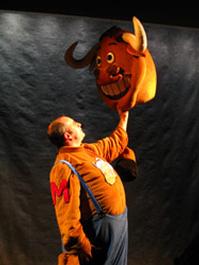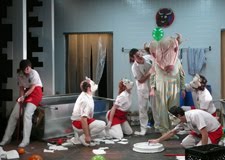Teaser Cow
Posted January 29th, 2010 by Sean Williams
For the first time this week, my evening contained an actual performance piece that I could talk about here, instead of a reading or some other kind of not-ready-for-publication work, and it was a welcome change. Last night we saw Teaser Cow by Clay McLeod Chapman , who’s play Commencement would have been a top five pick for me last year (if I was organized enough to do such things.)
When I see two disparate pieces like this, I’m fascinated by the ways in which each succeeds compared to the other. Whatever else may or may not be in either of these scripts, there is something there that allows actors of great talent to absolutely glow. In Commencement, Hannah Cheek delivered a master class, a tour-de-force of brilliance, and last night’s show gave me a handful of similarly brilliant performances.
 For context, the play is a very clever combination of the treatises inside “Fast Food Nation” with the myth of the minotaur. Greece is now a modern city packed with burger shacks, all licensed by the same family (instead of “McDonalds” they are “Minos Burger” joints) Minos is given a cow that he won’t sacrifice, so the gods infect his wife with the desire to mate with it, which creates the minotaur. Their daughter is now a disaffected youth, her boyfriend is Theseus, who’s hellbent on bringing down the Fast Food Empire. Daedalus creates the titular Teaser Cow, and then engineers cheaper beef and test-tube food, the Minotaur is used as a kind of Ronald McDonald stand in at children’s parties, and there is also a haunted midwife working behind the scenes of the family drama.
For context, the play is a very clever combination of the treatises inside “Fast Food Nation” with the myth of the minotaur. Greece is now a modern city packed with burger shacks, all licensed by the same family (instead of “McDonalds” they are “Minos Burger” joints) Minos is given a cow that he won’t sacrifice, so the gods infect his wife with the desire to mate with it, which creates the minotaur. Their daughter is now a disaffected youth, her boyfriend is Theseus, who’s hellbent on bringing down the Fast Food Empire. Daedalus creates the titular Teaser Cow, and then engineers cheaper beef and test-tube food, the Minotaur is used as a kind of Ronald McDonald stand in at children’s parties, and there is also a haunted midwife working behind the scenes of the family drama.
Sorry, I just hate the part where everyone discusses the plot.
Especially in a piece like this. The plot is loose, perhaps too loose for some, and there are a lot of moments that function more as theatrical ideas than they do as standard story-telling. Chapman has woven in wonderful chunks of language that constantly recall and insinuate the larger themes, little things like Ariadne saying “My dad would have my hide if he knew…” when she’s in the middle of a cow farm. Thankfully, the director, the brilliant Ianthe Demos and the actors knew not to lean on any of these lines, and even though the play is drenched with this language, Demos keeps the action moving and the world just exists *through* the words.
In the end, Fast Food Nation is almost a call to arms, and I believe that what Chapman was doing with this piece was to use the warnings of our forefathers as a tool to discuss a real problem in our current world. Religious teachings aren’t meant to be literal, despite the idiocy of many in America’s Christian Right, and the Greek Myths are meant to be parables. When we talk of Atalanta and the apples, we’re talking about rebellion and female archetypes… we’re not actually suggesting you risk your life in a foot race, armed only with apples.
The Minotaur myth has an awesome elegance to it in this context. Daedalus created a labyrinth in the original myth and, in this story, he discovers that cows can be fed corn mixed with protein from their own blood. Which will lead to Mad Cow disease, which creates… long strings of protein in the brain, a sort of labyrinth. In one really beautiful turn of phrase, Ariadne is talking to her younger brother and she reminds us that cows are essentially peaceful and vegetarian, that the minotaur didn’t have a taste for blood “until we fed it to you…”
It’s bold and it is brilliant, but for me it didn’t fully work as a piece of theater. I wanted more story, less myth, I wanted to spend all my time with the characters that this company created, and less time dealing with the ideas. It could be that I’ve already read “Fast Food Nation”, but the occasional wanderings into agitprop, while always a little thrilling, actually slowed my investment in the actual story. I see this not as a failing of the script, but rather a preference of mine. I like to be shown everything and told nothing.
But make no mistake, this is a passionately created production, from top to bottom. From the fast-food clad employee handing out menu-programs at the front door to the incredible grease-grime that covers the lower two feet of the set, this is a lovinlgly crafted work of art. Mike Riggs’ lighting design and Kay Lee’s costume design are visible and invisible, piercing and mollifying, outrageous and functional, each when they need to be. James Hunting’s set is transporting. If you think that you’re tired of seeing plays where they use two benches… just wait. At the end of the play, you’ll look back on this set and shake your head. Whole worlds are created with a few well-constructed tables and a brilliant cast.
That’s, of course, how you know you’re dealing with a fantastic director. There is a different feel to an ensemble company, and the nearest I can compare this to is Flux’s recent “Lesser Seductions of History”. There is no way to fake the intimacy and trust that an ensemble of actors can create, under the guidance of a strong leader with a great eye. I’m particularly heartened that, in both cases, the directors are women (as is the case with our company). I know that women playwrights are under-served, but if the plays are written by men, I’m glad to know that they are being created on stage by women.
The entire ensemble was really strong, but I want to mention a few actors by name. Gregory Waller, as Minos, is marvelous. He had the perfect balance of entitlement and self-loathing that comes naturally to kings. Jim Kane is credited with “The Royal ‘We'”, but he plays the kid-hating Ronald McDonald stand-in. This is a part that can be done badly in a hundred ways, and Jim plays the brilliant edge of every choice. It’s astonishing to see a character-actor in an over-the-top part play each moment so simply – he’s in a play that is drenched in hamburger, he’s wearing a cow costume and he hates kids, so how did he manage to twist my heart? It was fantastic.
Now, I’ve made it a habit of assuming that you, the reader, know that I know some of these people and that this is a blog, not a review site, and that we’re all friends and blah, blah, blah… But Sarah-Jane Casey is a person that I was good friends with, maybe ten years ago, and we’ve just sorta lost touch. We were in a class together, and I thought she was fantastic, but lives happen and we all go about our own stuff…
When I recognized her in the play last night, I was actually choked up with pride. She is just so good in this play. I was utterly transfixed by her, throughout. She is the mother of the minotaur, the queen, the matriarch, dealing with the fact that the whole world knows she screwed a bull to create a monster, and yet… it’s her baby. That monster is her child. She is erotic, throughout, and yet never trashy, she’s feminine but never weak. She is an open vessel, utterly emotionally nude. It’s a wonderful, wonderful performance.
In the final analysis, I can tell you this – I read Fast Food Nation and avoided fast food and meat… for a while. After being reminded of the book’s contents (and the meat’s contents) I’m gonna go back to avoiding it
again. Had I not read the book before, I would be inspired to read it now. In the same way that “Lesser Seductions of History” made me look at the Obama Presidency in a different way, “Teaser Cow” has reminded me to think before I eat. And if a piece of theater gets into your hindbrain, you have to consider it a huge success.
Sean,
This is a great post. My overall experience of the play was less positive, even as I found individual moments, images, and passages of text striking. However, your response here makes me remember the play again, and piece together better in my mind what did work well. It's interesting, because Flux is considering several plays for next season that also weave Greek myth into contemporary situations, and the juxtapositions can be so powerful that they overwhelm character and plot completely. The long shadow of those myths can obscure as much as reveal. I'm glad to hear your experience was different, though, as I love those OYL folks.